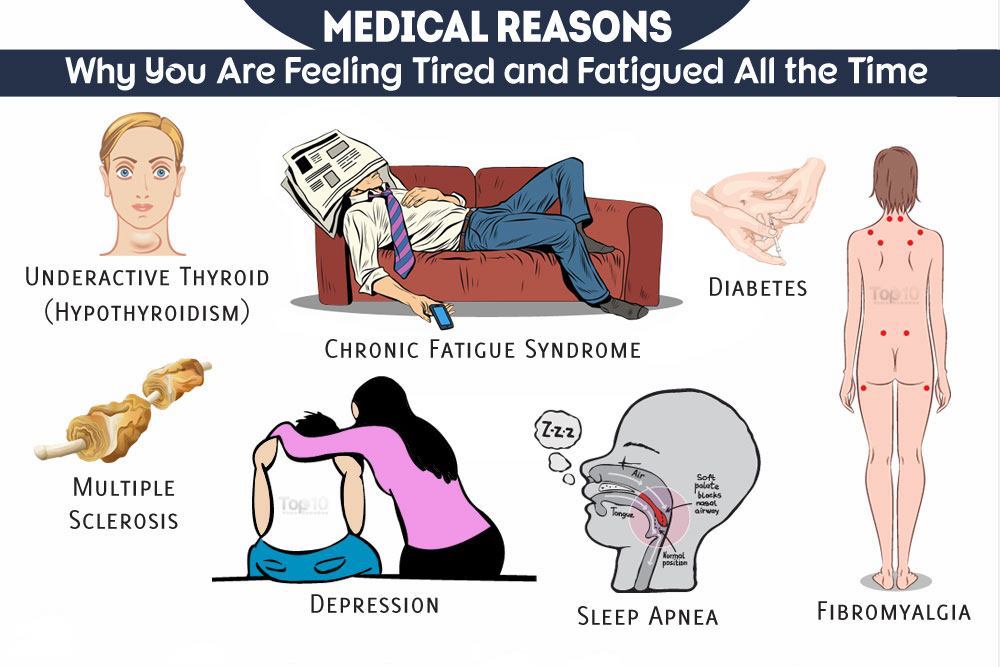
Heavy and regular work can always put you into being fatigued all the time. While regular fatigue is common, it isn’t something you should ignore. One study suggests that as much as one-third of teens are always fatigued due to work schedules.[1]
Often people believe that they have been fatigued for so long because of lack of sleep. Intriguingly, it may not necessarily be so. Fatigue may also be a sign of an underlying health condition. But, mostly, you may be feeling fatigued because of changes in lifestyle.[2]
If you have just changed your routine, you will need to consider everything. Even the smallest of things can bring a huge difference.
Feeling fatigued is common and easy to treat. Some of the prominent reasons you have been feeling tired lately include the following.[3]
Too much of refined carbs
Believe it or not, but consuming too many refined carbs can make your body weak too. Also, eating a lot of carbs can make you feel tired the entire day.[4]
Consuming a high amount of refined carbs increases the blood sugar levels to increase falls. This sudden increase and fall can make you exhausted.
You may want energy to increase in your body, but it can have its own negative impacts. Foods such as okra and dried bonito broth can help to increase alertness, thereby reducing fatigue.
Anemia
Compared to men, women are most prone to anemia. Anemia is a blood condition caused mostly due to a deficiency of iron in the blood.[5]
People suffering from anemia develop sickle-shaped red blood cells. The iron in your blood moves out of the body.
Iron is the carrier of oxygen in the blood. Those having low iron levels due to anemia often get dizzy. They feel tired the entire day and may feel as if they have a dizzy vision when they stand up. Brain fogging is also commonly seen in people suffering from anemia.
If you have been noticing the symptoms of anemia, you may prefer consulting a doctor and getting the test done. One of the easiest ways to detect anemia is frequent heart palpitations on standing or sitting.
Diabetes
Are you suffering from diabetes? You are prone to feeling fatigued and fired a lot. This is usually because your body has been functioning that way. Sudden changes in the blood sugar level use a lot of energy from the body.[6]
Doctors have often considered fatigue to be a common symptom of diabetes. So, if you have noticed this, there isn’t anything to worry about. However, if you are unsure of whether or not you have diabetes, it is better to get yourself checked. The best sign to check for diabetes is to observe if you have the urge to go to the bathroom regularly and are feeling thirsty too often.
Cardiovascular disease
Feeling fatigued too often is often a sign of cardiovascular disease or congestive heart failure. If your heart fails to pump enough blood, the fatigued feeling will keep on increasing.[7]
People with cardiovascular disorders may feel fatigued too often because of vigorous exercise. Also, sometimes it may cause a lot of other symptoms such as swelling of legs and arms and shortness of breath.

Sleep Apnea
Have you been getting enough sleep? Then why do you feel fatigued the entire day? If you feel you’re the only one experiencing this, you’re not. Many like you get enough sleep yet feel fatigued the whole day.[8]
Sleep apnea is one of the most common disorders that prevent you from getting the required amount of oxygen during your sleep. Since your body isn’t getting enough oxygen, it also means you are devoid of the real rest.[9]
If your body fails to get enough sleep, your body immediately notices it. As a result, you may often wake up in the middle of the night and thus have a hard time falling asleep again. Also, when you don’t get enough sleep during the night, you feel fatigued and want to complete it during the day. Thus, the feeling of tiredness during the day persists.
You may not realize the importance of sleep, but it can do wonders only if you move to it in the right direction. Also, various devices are available in the market that can make it easy for you to overcome sleep apnea.
Devices like Continuous Positive Airway Pressure (CPAP) can be of great help to keep airways open for the body. This eventually allows us to keep the air flowing in the body and thereby promoting a good night’s sleep.
Menopause
Menopausal women are more prone to feeling fatigued than anyone else. As women reach the age of menopause, they have a tough time sleeping. The irregular sleep can further be tough, and thus, the woman fails to get enough sleep.
Menopausal women experience a lot of hormonal changes. This further paves the way for a lot of night sweats and hot flashes. These hot flashes and night sweats can keep you awake the entire night. Thus, the prevalence of staying tired the whole day becomes common.
Depression
Depression devoids your brain from producing the right chemicals. Serotonin, also known as the happiness hormone, makes you feel active and regulates the body clock.[10]
However, depression can reduce the level of serotonin production, thereby making you feel tired the entire day. Also, depressed people have a tough time sleeping and waking up as per the general schedule.[11]
If you have been feeling tired lately despite getting proper sleep, it is an indication that you need to see a doctor soon. It is necessary to begin with your therapy and medicine so that you can have a peaceful and comfortable life.
[1] https://www.ncbi.nlm.nih.gov/pmc/articles/PMC181235/
[2] Rothwell NJ, Hopkins SJ. Cytokines and the nervous system, 2: actions and mechanisms of action. Trends Neurosci. 1995;18:130–136. [PubMed] [Google Scholar]
[3] https://www.ncbi.nlm.nih.gov/pmc/articles/PMC3479364/
[4] https://www.ncbi.nlm.nih.gov/pmc/articles/PMC5247454/
[5] Sharpe M. Chronic fatigue syndrome. Psychiatr Clin North Am. 1996;19:549–573. [PubMed] [Google Scholar]
[6] https://www.ncbi.nlm.nih.gov/pmc/articles/PMC2662098/
[7] Bliwise DL. Sleep in normal aging and dementia. Sleep. 1993;16:40–81. [PubMed] [Google Scholar]
[8] https://www.ncbi.nlm.nih.gov/pmc/articles/PMC5072300/
[9] Cantor F. Central and peripheral fatigue: exemplified by multiple sclerosis and myasthenia gravis. PM R. 2010;2:399–405. [PubMed] [Google Scholar]
[10] Chaudhuri A, Behan PO. Fatigue and basal ganglia. J.Neurol.Sci. 2000;179:34–42. [PubMed] [Google Scholar]

